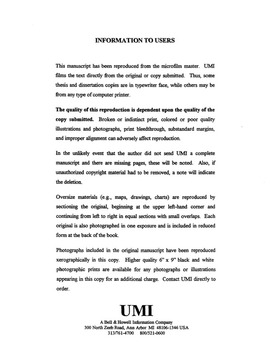| dc.contributor.advisor | Rideout, Roger, | en_US |
| dc.contributor.author | Montandon, Maria Isabel. | en_US |
| dc.date.accessioned | 2013-08-16T12:30:18Z | |
| dc.date.available | 2013-08-16T12:30:18Z | |
| dc.date.issued | 1998 | en_US |
| dc.identifier.uri | https://hdl.handle.net/11244/5708 | |
| dc.description.abstract | The topics most frequently addressed at the Conference were Practice Teaching (20.5%), Pedagogy Curriculum Program (18.0%), Technology (16.6%), Learning Theories (15.2%), Literature (13.1%), and Performance (12.0%). Among the least frequently discussed (2.8% or less) were Piano Materials, History of Piano Pedagogy, Music Education/Piano Pedagogy Relationship, Research in Piano Pedagogy, and Students Participation. Topics related to performance (Medical Problems, Collaborative Performance, Performance Majors) increased in the two last meetings. The format analysis indicated a growth in the teaching demonstration sessions, in the music industry presence, and in the performance teachers' participation. However, the presentation of papers at the meetings decreased. | en_US |
| dc.description.abstract | The purpose of this study was to identify trends in piano pedagogy in the United States as reflected by the Proceedings of the National Conference on Piano Pedagogy (NCPP), 1981-1995. A content analysis was used to verify the frequency of topics and variation of formats in the Conference. Articles from the papers and committee sessions were classified according to: (1) their nature (self-reflective, reports, research, or scholarly type of article); (2) their content (referring to pedagogy programs or not); and (3) the frequency of topics. A list of 31 categories and sub-categories was compiled. | en_US |
| dc.description.abstract | The format analyses identified the activities that occurred at each Conference, the structures of the teaching demonstrations, and the kinds of committees. An interview with Richard Chronister, the NCPP's executive director, provided further information about the Conference's philosophy and principles. | en_US |
| dc.description.abstract | The findings revealed that the great majority of articles and reports were self-reflective (82.6%). Only 8.8% were research and scholarly papers (7.8%). Articles and reports referring to piano pedagogy programs declined from 100% in 1980 to 38% in 1994. | en_US |
| dc.description.abstract | Other trends indicated in the findings included: a shift in focus from pedagogy to performance at the last two meetings; the emphasis on practical topics and activities; the lack of research and scholarly papers; the closer connection between learning theories, practice teaching, and teaching materials at early years of the Conference; a teacher-centered approach in curriculum decisions; and the lack of self-analyzing discussions in the piano pedagogy field. | en_US |
| dc.format.extent | xiii, 194 leaves ; | en_US |
| dc.subject | Music. | en_US |
| dc.subject | Education, Music. | en_US |
| dc.subject | Piano Instruction and study Research. | en_US |
| dc.subject | Musicology Methodology. | en_US |
| dc.title | Trends in piano pedagogy as reflected by the proceedings of the National Conference on Piano Pedagogy (1981-1995). | en_US |
| dc.type | Thesis | en_US |
| dc.thesis.degree | Ph.D. | en_US |
| dc.thesis.degreeDiscipline | School of Music | en_US |
| dc.note | Source: Dissertation Abstracts International, Volume: 59-09, Section: A, page: 3387. | en_US |
| dc.note | Adviser: Roger Rideout. | en_US |
| ou.identifier | (UMI)AAI9905624 | en_US |
| ou.group | Weitzenhoffer Family College of Fine Arts::School of Music | |
